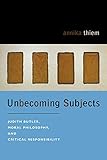Unbecoming Subjects : Judith Butler, Moral Philosophy, and Critical Responsibility / Annika Thiem.
Material type: TextPublisher: New York, NY : Fordham University Press, [2022]Copyright date: ©2008Description: 1 online resource (288 p.)Content type:
TextPublisher: New York, NY : Fordham University Press, [2022]Copyright date: ©2008Description: 1 online resource (288 p.)Content type: - 9780823228997
- 9780823293476
- online - DeGruyter
| Item type | Current library | Call number | URL | Status | Notes | Barcode | |
|---|---|---|---|---|---|---|---|
 eBook
eBook
|
Biblioteca "Angelicum" Pont. Univ. S.Tommaso d'Aquino Nuvola online | online - DeGruyter (Browse shelf(Opens below)) | Online access | Not for loan (Accesso limitato) | Accesso per gli utenti autorizzati / Access for authorized users | (dgr)9780823293476 |
Frontmatter -- Contents -- Acknowledgments -- Abbreviations -- Introduction -- Part One Challenges to the Subject -- 1. Subjects in Subjection: Bodies, Desires, and the Psychic Life of Norms -- 2. Moral Subjects and Agencies of Morality -- Part Two Responsibility -- 3. Responsibility as Response: Levinas and Responsibility for Others -- 4. Ambivalent Desires of Responsibility: Laplanche and Psychoanalytic Translations -- Part Three Critique -- 5. The Aporia of Critique and the Future of Moral Philosophy -- 6. Critique and Political Ethics: Justice as a Question -- Works Cited -- Index
restricted access online access with authorization star
http://purl.org/coar/access_right/c_16ec
Moral philosophy and poststructuralism have long been considered two antithetical enterprises. Moral philosophy is invested in securing norms, whereas poststructuralism attempts to unclench the grip of norms on our lives. Moreover, poststructuralism is often suspected of undoing the possibility of ethical knowledge by emphasizing the unstable, socially constructed nature of our practices and knowledge. In Unbecoming Subjects, Annika Thiem argues that Judith Butler's work makes possible a productive encounter between moral philosophy and poststructuralism, rethinking responsibility and critique as key concepts at the juncture of ethics and politics. Putting into conversation Butler's earlier and most recent work, Unbecoming Subjects begins by examining how Butler's critique of the subject as nontransparent to itself, formed thoroughly through relations of power and in subjection to norms and social practices, poses a challenge to ethics and ethical agency. The book argues, in conversation with Butler, Levinas, and Laplanche, that responsibility becomes possible only when we do not know what to do or how to respond, yet find ourselves under a demand to respond, and even more, to respond well to others. Drawing on the work of Butler, Adorno, and Foucault, Unbecoming Subjects examines critique as a central practice for moral philosophy. It interrogates the limits of moral and political knowledge and probes methods of social criticism to uncover and oppose injustices.
Mode of access: Internet via World Wide Web.
In English.
Description based on online resource; title from PDF title page (publisher's Web site, viewed 03. Jan 2023)


